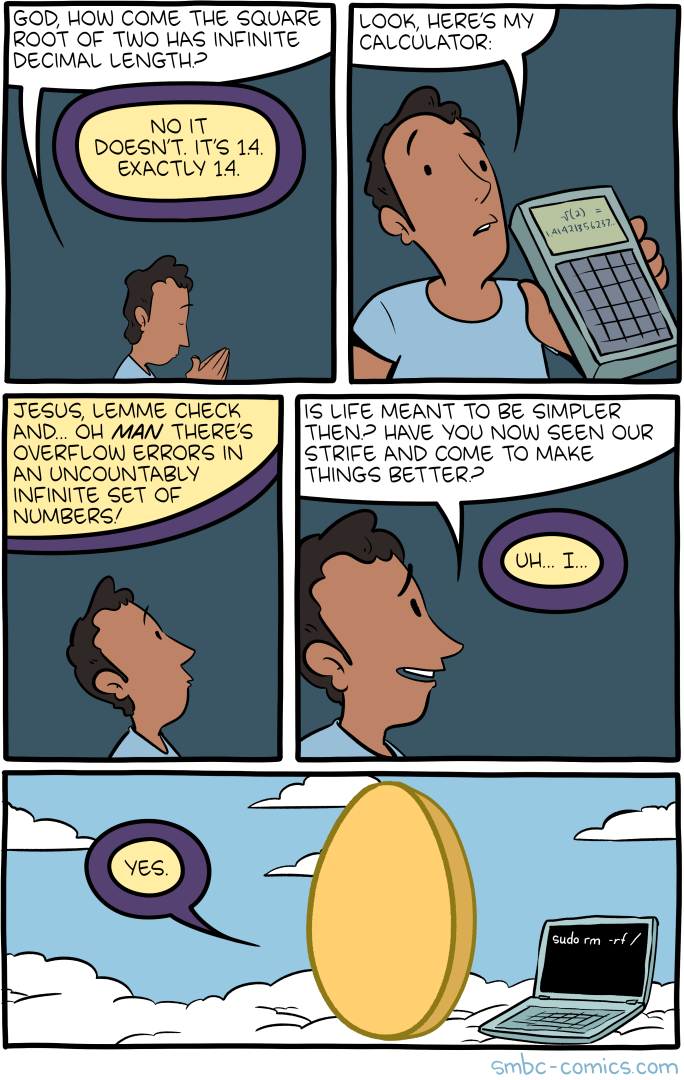The Pythagorean catastrophe
« previous post | next post »
Today's SMBC:
For those not learned in unix lore,
sudo rm -rf /
means "wipe the file system clean — remove everything".
This is the catastrophe that Pythagoras was worried about — see Thomas McEvilley, "The Shape of Ancient Thought: Comparative Studies in Greek and Indian Philosophies" (quoted in "Pavarotti and the crack to chaos", 9/7/2007), where you can also learn about the Pythagorean comma, evidence of how God screwed up the diatonic scale):
It requires a leap of horizon to understand the intensity with which such things mattered to ancient thinkers. … The issue which made [the Pythagorean comma] so pressingly important was nothing less than the question .. whether reality is mathematical or not.
When Pythagoras discovered (or learned) the so-called Pythagorean Theorem, … it is said that he hastened to sacrifice oxen. he felt that he had touched on a power center in the mathematical fabric of the universe. …
The Pythagorean Theorem is the threshold to the discovery of irrational numbers and incommensurable lengths — a discovery which Hellenists attribute to Hippasus of Tarentum, a renegade Pythagorean whom, according to one account, Pythagoras pushed off a boat for revealing to outsiders the tragic secret of the Pythagorean Theorem, which was irrationality or incommensurability. … The discovery that the side and diagonal of a square will always be incommensurable produced an ideological convulsion in the Pythagorean order comparable to the shock conveyed by the discovery of the Precession or the Pythagorean comma. … Like the Precessional drift and the Pythagorean comma, this apparent crack or gap in the mathematical fabric of the universe seemed ominous, as if such cracks lead through the membrane of order to chaos. They deny that the universe is orderly and hence that it is cognizable, and thereby remove credibility from all human thought. The Precession threatens the calendar and all the depends on it, and through the Pythagorean comma, as through a crack to chaos, the plethora of untuned sounds that could disrupt the harmony of the universe flows in.
The mouseover title: "This sort of thing happens about once a week."
The aftercomic:


Peter Metcalfe said,
February 18, 2020 @ 3:32 pm
Wot the Pythagoreans and other Greeks actually thot about the irrationality of the square root of two.
http://kiwihellenist.blogspot.com/2015/11/were-greeks-scared-of-irrational-numbers.html
[(myl) Should have known that the "don't tell anybody about the divine screw-up" story was too good to be true.]
MattF said,
February 18, 2020 @ 3:59 pm
Can someone explain what the SMBC symbol for God (a floating disc with a circular arrangement of triangular notches) is supposed to represent. Or is it just an unfathomable mystery?
Jim said,
February 18, 2020 @ 4:33 pm
I think the disk symbol for god is supposed to tie in to the halo from medieval art. Like this overabundance of them:
https://i.pinimg.com/736x/f0/9b/45/f09b457e2e6844ae40405b70437573bf–medieval-manuscript-halo.jpg
Brett said,
February 18, 2020 @ 5:15 pm
It is not correct that the existence of irrational numbers did not cause any consternation for Greek mathematicians. Until the work of Eudoxus of Cnidus, they did not possess the capabilities to work with arbitrary ratios as arithmetic objects. This meant, for example, that irrational ratios that arose as ratios of lengths were of a complete different nature from irrational ratios that arose as ratios of areas or volumes. These distinctions seem meaningless today, but without at least the beginnings of the understanding of real numbers, they are hard to deal with. (A century before Eudoxus, the failure to understand the continuity of the real line led to Zeno's Arrow Parradox.) Until the theory of proportions and divisions was put of firm foundation, there were debates about the correctness of the some of the theorems of Euclidean geometry (specifically those concerning similar triangles, where ratios play a key role).
Philip Taylor said,
February 19, 2020 @ 3:36 am
I do not understand, Brett. Why did the fact that "[Greek mathematicians] did not possess the capabilities to work with arbitrary ratios as arithmetic objects" mean that "irrational ratios that arose as ratios of lengths were of a complete different nature from irrational ratios that arose as ratios of areas or volumes" ? I cannot see the connection between the two halves of the compound statement.
Robert Coren said,
February 19, 2020 @ 10:25 am
Well, the Pythagorean comma exists because 2⁷ is very close, but not equal, to (3/2)¹². Can this be regarded as divine error?
cameron said,
February 19, 2020 @ 1:00 pm
@Philip Taylor – The Greeks had numbers and they understood that numbers could be incommensurable with one another. They dealt with this as thinking of commensurable and incommensurable numbers as being in completely different categories from one another. They have two different categories of numbers but they did not have a "number line" where all the numbers are examples of a single notion of something like a "general magnitude". See for example, in Euclid, where Books VII-IX deal with numbers that are always commensurable, and Book X, which deals with numbers whose ratios cannot be reduced to whole number ratios.